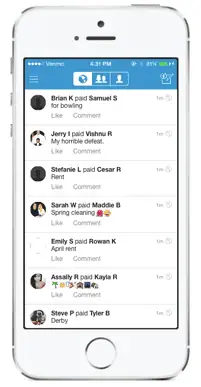
Facebook is Hungry for Mobile Payments
Brought to you by StrategyCorps

Facebook isn’t just satisfied with having more users than any other social media in the world. They’re craving their piece of the future of mobile payments. With the recent announcement to offer peer-to-peer payments through its Messenger app, Facebook is seeking to establish a deeper connection to users’ finances and to take a bite out of traditional financial transactions.
Facebook Payments is completely free and will first be available via Messenger to users in the U.S. only. The feature can be used on the desktop or within the Facebook Messenger app, which launched last year as a companion to the Facebook app. Once a Visa or MasterCard debit card is linked to the Facebook account, users can open a chat with a friend, tap the dollar sign icon, type in the dollar amount and press send. That money is deposited to the friend’s bank account within a few days.
It’s a similar process to the already extremely popular peer-to-peer payments app Venmo, owned by PayPal, which was one of the first apps to take a social network approach to mobile finance. With Venmo though, you see payment interactions between all of your friends in the app. It doesn’t show dollar amounts, but the captions, comments and likes between users tell a story of what those people are up to and spending money on, and with whom, which is a lot like what you discover scrolling through a Facebook News Feed.
The move to make Messenger a separate app from Facebook, disassociating it with the News Feed and adding more privacy, was strategic though. Rather than mixing your payments with everything else you find on Facebook — pictures and posts from friends, games, location check-ins, advertisements — it may make handing over your payment information more appetizing if it’s in a separate app within a private message.
Steve Davis, product manager of Facebook Payments, said in a TechCrunch interview that “conversations about money are already happening on Messenger,” such as people chatting about splitting the check for dinner, travel plans or purchasing concert tickets. “What we want to do is make it easy to finish the conversation in the same place you started. You don’t have to switch to another app,” says Davis.
Introducing peer-to-peer payments into its Messenger app was rumored for months before being officially announced in early March, one of the earliest signs being the hiring of the past PayPal president David Marcus to lead Messenger. That Facebook Payments announcement was soon followed by the Facebook F8 developer conference, where Business on Messenger was also unveiled, a feature that will soon allow customers to chat with merchants directly through Messenger about orders and shipping updates. Plus, Facebook announced software tools that make it easy for third party developers to integrate with Messenger—a move that eventually may lead to accepting payments from users via the Messenger app.
While Facebook may not be charging fees for payments in the beginning, there is potential to generate additional advertising revenue in the future, which already brought in over $3.5 billion during the fourth quarter of 2014. When Facebook gains access to users’ payment details and is able to track what people are buying, it’s likely they can also deliver even more highly targeted advertising.
Facebook Advertising started out small and inexpensive but has spent years nipping away at traditional advertising, until it’s now one of the most sought after methods of targeted advertising, and it is only gaining more traction. So while Facebook may be taking small bites of payments now, it has the potential to be one of the biggest financial disruptors yet, simply because of its reach to 1.19 billion mobile monthly active users, about half of those in the U.S., and already 500 million people using Messenger.
Who knows how Facebook’s introduction to finances will settle with people, but if peer-to-peer payments is only its first course, Facebook has a lot more to devour along its way to disrupting traditional financial relationships.


